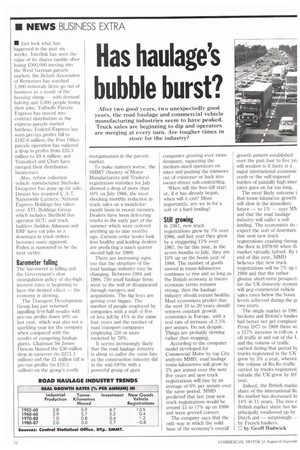Has haulage's bubble burst?
Page 14

If you've noticed an error in this article please click here to report it so we can fix it.
• Just look what has happened in the past six weeks. Interlink has seen the value of its shares tumble after losing £500,000 moving into the West German parcels market; the British Association of Removers has watched 1,000 removals firms go out of business as a result of the housing slump — with demand halving and 5,000 people losing their jobs; Tuffnells Parcels Express has moved into contract distribution as the express parcels market hardens; Federal Express has seen pre-tax profits fall to £187.6 million: the Post Office parcels operation has suffered a drop in profits from £35.3 million to £9.4 million; and Transfleet and Chart have merged their distribution businesses.
Also, refuse collection vehicle manufacturer Shelvoke Dempster has gone up for sale; Danzas has acquired C.A.T. Nationwide Carriers; National Express Holdings has taken over AIL Holdings Group which includes Sheffield bus operator SUT; and truck builders Seddon Atkinson and ERF have cut jobs as a downturn in truck orders becomes more apparent. Foden is rumoured to be the next victim.
Barometer falling
The barometer is falling and the Government's slow strangulation policy of sky-high interest rates is beginning to have the desired effect — the economy is slowing.
The Transport Development Group has just returned appalling first-half results with pre-tax profits down 40% on last year, which was also not a sparkling year for the company when compared with the results of competing haulage giants. Chaimian Sir James Duncan blamed the £36 million drop in turnover (to £271.1 million) and the million fall in pre-tax profits (to £19.2 million) on the group's costly
reorganisation in the parcels market.
To make matters worse, the SMMT (Society of Motor Manufacturers and Traders) registration statistics for July showed a drop of more than 10% on July 1988, the most shocking monthly reduction in truck sales on a month-formonth basis in recent memory. Dealers have been delivering trucks in the early part of the summer which were ordered anything up to nine months ago. Current order books look less healthy and leading dealers are predicting a much quieter second half for 1989.
There are increasing signs too that the structure of the road haulage industry may be changing. Between 1984 and 1988, 750 small haulage firms went to the wall or disappeared through mergers and acquisitions. The big boys are getting ever bigger. The number of people employed by companies with a staff of five or less fell by 41% in the same four years and the number of road transport companies employing 250 or more rocketed by 78%.
It seems increasingly likely that the road haulage industry is about to suffer the same fate as the construction industry did in the mid-1970s with a powerful group of giant companies growing ever more dominant, squeezing the medium-sized operators on rates and pushing the minnows out of existence or back into owner-driver sub-contracting.
'When will the free-fall start or, if it has already begun, when will it end? More importantly, are we in for a soft or a hard landing?
Still sowing
In 1987, new truck registrations grew by 7% over 1986, and last year they grew by a staggering 17% over 1987. So far this year, in the seven months to July, they are 10% up on the boom year of 1988. The number of goods moved in tonne-kilometres continues to rise and so long as the British economy in macroeconomic terms remains strong, then the haulage industry should remain healthy. Most economists predict that the next 10 to 20 years should witness constant growth economics in Europe, with a real rate of increase of 2.5% per annum. Do not despair. Things are probably slowing rather than stopping.
According to the computer model developed for Commercial Motor by top City analysts NIMD, road haulage tonne-kilometres will grow by 2% per annum over the next five years and new truck registrations will rise by an average of 6% per annum over the same period. MMD predicted that last year new truck registrations would be around 15 to 17% up on 1988 and were proved correct.
The company says that the only way in which the solid base of the economy's overall growth pattern established over the past four to five ye; will weaken is if there is a major international economic crash or the self-imposed burden of painfully high inter rates goes on for too long.
The most likely outcome i that tonne-kilometre growth will slow in the immediate future — to 1% — says MN and that the road haulage industry will suffer a soft landing. The economists do ; expect the sort of downturn that sent new truck registrations crashing throng the floor in 1979/80 when th market virtually halved. By end of this year, MMD believes that new truck registrations will be 7% up c 1988 and that the rather gloomy short-term prospect; for the UK domestic econon will peg commercial vehicle sales rates below the boom levels achieved during the p; two years.
The single market in 1992 beckons and Britain's hauliet had better not get complace From 1977 to 1988 there w; a 117% increase in roll-on, off traffic in and out of the and the volume of traffic carried during that period b3 trucks registered in the UK grew by 5% a year, wherea the volume of Ro-Ro traffic carried by trucks registered outside the UK grew by 10', year.
Indeed, the British marke share of the international Rc Ro market has decreased b3 14% in 11 years. The loss c British market share has be principally swallowed up by Dutch and — surprisingly — by French hauliers.
0 by Geoff Hadwick
































































































































